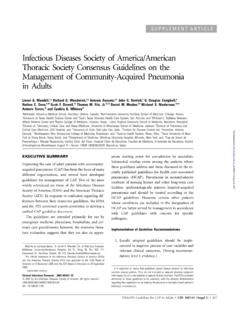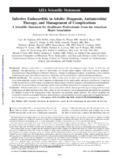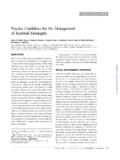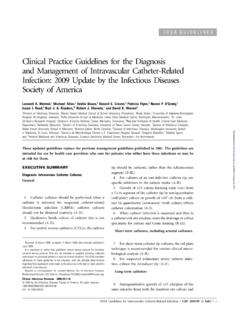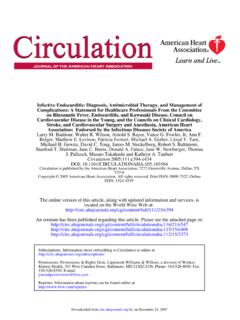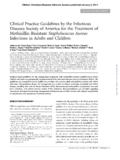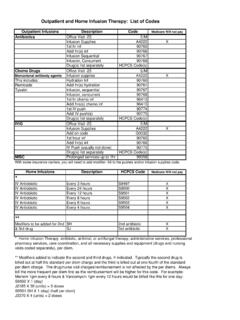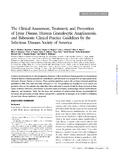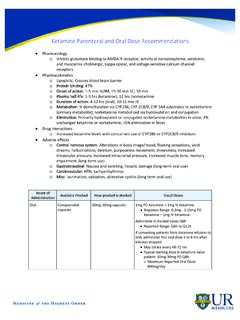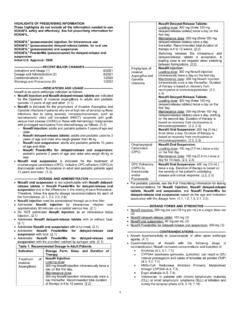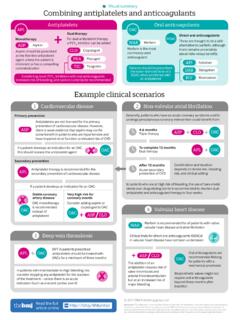Transcription of Paxlovid for the Treatment of COVID-19: Considerations for ...
1 Paxlovid for the Treatment of COVID-19: Considerations for People With HIV and Hepatitis C Version: 5/ 9/ 2022 Paxlovid (nirmatrelvir tablets and ritonavir tablets) is available under Emergency Use Authorization from the Food and Drug Administration for the Treatment of COVID-19. FDA authorized Paxlovid for Treatment of mild-to-moderate COVID-19 in adults and pediatric patients (12 years of age and older weighing at least 40 kilograms or about 88 pounds) and who are at high risk of progression to severe COVID-19. The medicine should be started within 5 days after a person develops symptoms of COVID-19. This brief was developed to respond to provider questions about treating patients with HIV and HCV with Paxlovid since one of the components of Paxlovid -- ritonavir -- is also part of many HIV and HCV Treatment regimens.
2 In addition, Paxlovid may result in significant drug interactions with other commonly used comedications in people with HIV or hepatitis C. The information included is based on the FDA Paxlovid EUA Fact Sheet for Healthcare Providers and ot her sources as noted. For clinical guidance on the use of Paxlovid and other COVID-19 therapeutics, see the IDSA Guidelines on the Treatment and Management of Patients With COVID-19, IDSA Management of Drug Interactions With Nirmatrelvir/Ritonavir ( Paxlovid ): Resource for Clinicians and the IDSA Point of Care Reference guide. For clinical guidance on HIV Treatment , refer to the HHS Guidelines for the Use of Antiretroviral Agents in Adults and Adolescents With HIV.
3 While initially Paxlovid was in short supply it is now more widely available. Learn more about efforts to improve access to Paxlovid and other COVID-19 therapeutics and where they are available in your community by visiting the Department of Health and Human Services Test to Treat web page. FREQUENTLY ASKED QUESTIONS Can Paxlovid be used for the Treatment of COVID-19 in people with HIV, and what are the potential drug interactions? According to CDC, people with HIV may be at higher risk for severe outcomes from COVID-19. Due to this increased risk, people with HIV may be considered for Treatment with Paxlovid . Paxlovid may be administered with HIV antiretrovirals, including those agents boosted with ritonavir or cobicistat (most HIV protease inhibitors and elvitegravir).
4 See Contraindications (page 6) in the FDA Fact Sheet. People with HIV should continue their HIV Treatment , including those on ritonavir- and cobicistat-containing HIV regimens, without interruption during Paxlovid therapy. Patients taking an HIV regimen that includes ritonavir or cobicistat should be monitored for increased Paxlovid or protease inhibitor adverse advents, but doses of the HIV protease inhibitor or cobicistat do not need to be preemptively changed. See Table 1: Established and Other Potentially Significant Drug Interactions (page 11) in the FDA Fact Sheet. Paxlovid may affect the drug concentrations of protease inhibitors and other HIV antiretrovirals. See the University of Liverpool COVID-19 Drug-Drug Interaction website.
5 2 Can people with HIV develop drug resistance to protease inhibitors with Paxlovid ? While people with undiagnosed or uncontrolled HIV could theoretically develop protease inhibitor resistance, given the short duration of Paxlovid therapy (5 days), this is very unlikely. People with HIV who are virologically suppressed should not be at risk for developing HIV resistance if treated with Paxlovid . See Risk of HIV-1 Resistance Development (page 7) in the FDA Fact Sheet. Can Paxlovid be used for Treatment of COVID-19 in people with HCV, and what are the potential drug interaction concerns? According to CDC, people with HCV may be at higher risk for severe outcomes from COVID-19.
6 Due to this increased risk, people with HCV may be considered for Treatment with Paxlovid . Patients taking ritonavir-containing HCV regimens should continue their Treatment as indicated but should be monitored for increased Paxlovid or protease inhibitor adverse advents. It is not recommended to co-administer Paxlovid with glecaprevir/pibrentasvir. Paxlovid may affect the drug concentrations of DAAs. See the University of Liverpool COVID-19 Drug-Drug Interaction website. Are dosing adjustments recommended when co-administering Paxlovid with other therapies containing ritonavir or cobicistat? A dosage adjustment is not required when treating patients with Paxlovid who are taking HIV or HCV regiments containing ritonavir or cobicistat.
7 What resources are available to evaluate and manage potential drug-drug interactions between Paxlovid and other medications? Refer to the FDA Fact Sheet Section 4 for drugs that are contraindicated with Paxlovid (page 6) and Table 1 for Established and Other Potentially Significant Drug Interactions (page 13). The University of Liverpool COVID-19 Drug-Drug Interaction website. The NIH COVID-19 Treatment Guidelines Panel s Statement on Potential Drug-Drug Interactions Between Ritonavir-Boosted Paxlovid and Concomitant Medications. Resources FDA Paxlovid EUA Fact Sheet for Healthcare Providers Information on dosage and administration, drug interactions, contraindications, adverse reactions and more.
8 FDA Paxlovid EUA Fact Sheet for Patients, Parents and Caregivers Information for patients. IDSA Guidelines on the Treatment and Management of Patients With COVID-19 Guidelines maintained by IDSA updated with new recommendations for antivirals and immunomodulators. IDSA COVID-19 Real-Time Learning Network Expertly curated, timely resources for the frontline health care community. ASPR/HHS COVID-19 Therapeutics Information on the administration and allocation of oral antivirals and monoclonals for the prevention and Treatment COVID-19. Guidelines for the Use of Antiretroviral Agents in Adults and Adolescents With HIV HIV Treatment guidelines maintained by an HHS Working Group of the Office of AIDS Research Advisory Council.
9
